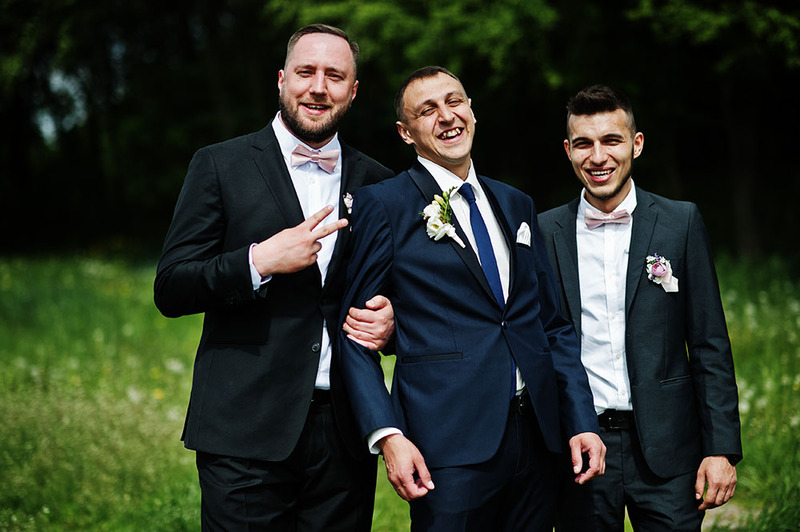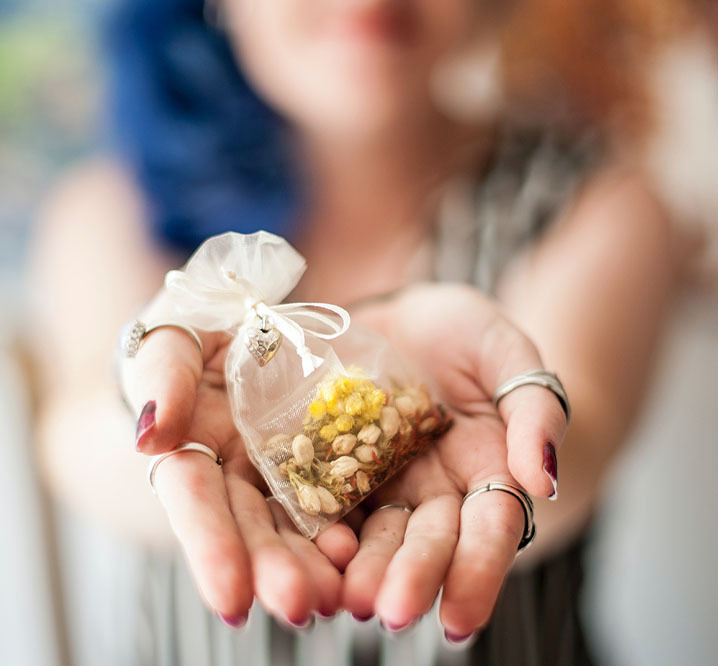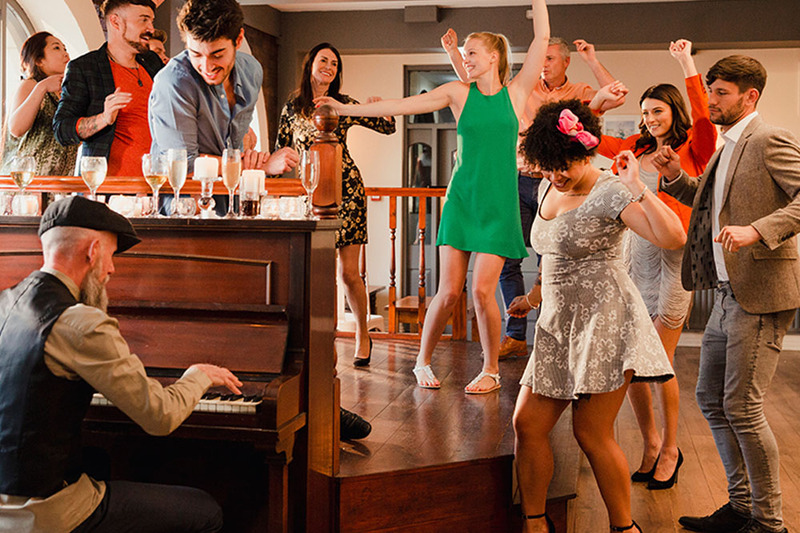AMERICAN WEDDINGS BLOG
Stay up to date with the latest wedding ceremony trends, script writing inspiration, tips and advice for first-time officiants, and news that matters to couples and wedding ministers.
Stay up to date with the latest wedding ceremony trends, script writing inspiration, tips and advice for first-time officiants, and news that matters to couples and wedding ministers.
Published Wednesday, Aug. 16th, 2023

Marrying yourself: Self-marriage as the ultimate act of self love
If you’ve been asked to attend a ‘self marriage’ ceremony, or would like to plan one for yourself, you’re probably wondering what exactly is involved.
We’ve all been to a wedding or two, but things are a little different when there’s only one person standing at the altar… If there even is an altar!
Common questions include: What is sologamy, in the first place? Is sologamy legal or symbolic? Will there be an officiant to perform the ceremony, like there is at a traditional wedding? Who will be on the guest list? What will the person who marries themself actually say and do? What are some examples of ‘soul vows’ or self-marriage vows? And do guests need to bring a gift?
We’ll answer all of these questions and more below, and give you a few ideas on how to plan a meaningful and profound sologamy ceremony.
Sologamy is the symbolic act of marrying oneself – making a promise to love, support, cherish, and provide for yourself just as you might for a spouse. These rituals hold profound meaning for solo marriers. They're affirming and empowering. They’re a declaration of self love and deep commitment to the self in every area of life.
A sologamy ceremony might look like a traditional wedding, with an aisle and an altar, but not always. They can be big or small, formal or casual, indoors or outdoors – just like other weddings!
Some people hold a sologamy ceremony as a symbol of their commitment to remain single or celibate, but for most people it’s a promise to remain authentic to themselves no matter what their relationship status is down the road. These ‘solo-marriers’ might later marry another person in a traditional wedding.
You may have heard the words ‘polygamy’ and ‘bigamy,’ which are used to describe two forms of plural marriage. ‘Sologamy’ uses the same basic language structure and means a ‘solo marriage.’ Sometimes this ritual is called ‘autogamy.’
Note: Sologamy should not be confused with self-uniting ceremonies, in which two people legally marry without the help of a wedding officiant. To learn more about self-uniting and self-solemnizing ceremonies, head here: Ask AMM: "Can I Perform My Own Marriage Ceremony?"

Photo: Brooke Lark / Unsplash
Many solo brides, grooms, and marriers choose to wear a 'sologamy ring' as a symbol of their commitment to self love. The ring above is etched with the empowering message "I am badass."
Sologamy ceremonies are symbolic and aren’t legally binding. They may be combined with other cultural and symbolic rituals, such as a naming ceremony.
Some people might choose to include legal elements in their ceremony, such as signing divorce papers or signing a will in the presence of witnesses, but this isn’t an intrinsic part of the self-marriage ritual.
Many people choose to have an officiant lead their sologamy ceremony, just as they would a traditional wedding. This officiant will greet guests, say a few words about the meaning of the ceremony, and lead the solo marrier through their vows.
The officiant doesn’t need any legal qualifications, however many people find that ordained ministers and professional wedding officiants hold unique qualifications that make them the best choice for the role. Experienced officiants will be familiar with relevant spiritual practices and ceremony formats, and some offer special packages for just this occasion!
Many solo marriers ask a close friend or family member to officiate the ritual. If you’ve been asked to officiate a self-marriage ceremony, consider getting ordained online with AMM and read our advice for wedding officiants on how to perform your first ceremony. Your minister credentials could come in handy at a later time!
Some ceremonies won’t have an officiant. In this case, the solo marrier will usually guide the ritual themselves, or ask guests to share the responsibility in a free-form ritual.

Photo: AS Photo Family / AdobeStock
While sologamy is most popular among women, people of all genders practice self-marriage! Above, a solo groom stands with his officiant and a close friend following the ceremony.
In general, the solo marrier will read a few ‘vows’ or promises during the ceremony. These vows will be unique to the person committing to themself, and are the central focus of the ceremony. These promises will form the foundation of the marrier’s relationship with themselves in the years to come. The marrier might also thank guests for coming, talk about why they’re holding the ritual, and share their hopes for the future.
We include a few sologamy vow examples below.
Other elements you might see during the ceremony include: the marrier drinking wine or tea from a ceremonial cup, lighting a candle or ceremonial fire, holding hands with guests to cast a sacred circle of protection, placing a symbolic ring on their finger, meditation, prayer, singing, spiritual bathing, ritual offerings, and more.
Spiritual elements you might see:

Photo (cropped): Katherine Hanlon / Unsplash
Other spiritual elements might be included, such as candle lighting, meditation, spiritual bathing, or offerings to spirits. Above, a solo marrier holds out a small offering of aromatic herbs and flowers.
Self-marriage vows are deeply personal and unique to each person, but there are a few common themes.
These common themes include promises to love, accept, protect, honor, heal, and value oneself; to prioritize personal growth and creative goals; and to remain authentic and independent in future romantic relationships.
Examples of sologamy vows:
“I promise to love myself as my imperfect self.”
“I promise to love myself at every size and in every iteration the future holds.”
“I vow to trust myself and my intuition as the voice of the Divine inside me.”
“I promise to honor myself and this life by taking care of my body and my mind, as my first priorities always.”
“I vow to prioritize my friendships and to never abandon myself or my family in the pursuit of love.”
“I promise to be grateful for what this life brings me, and to contribute to the collective good whenever possible.”
“I vow to live authentically, and to be unapologetically me in every area of my life. To wear what I want, eat what I want, live where I want, and love who I want.”
“I promise to live in faith, to look for the good, and to ask for help when I need it.”
“I vow to honor my calling as a ______, and to live my life in devotion to this higher purpose.”
‘Soul vows’ are a specific spiritual practice that takes this concept a step farther. These vows are affirmations a believer makes aloud while guided by spirit guides, angels, or god(s), and are defined by author Janet Conner as “your souls most precious values.” Believers will recite these affirmations as a mystical prayer, and they often take the form “I am…” versus “I promise to...”
An example of a ‘soul vow’ might be: “I am created from Divine love and carry love forth in every breath.”

Photo: dglimages / AdobeStock
Solo weddings are often followed by receptions and afterparties -- so get ready to dance!
Like traditional weddings, solo weddings can be large formal events, or small ‘elopements.’ This means that the guest list can vary from one person (just the marrier) to hundreds of people. There may be an afterparty or reception with guests, as well.
To decide who to invite to your own solo wedding, consider the people you want to support you in the years to come, the people who respect you and make you laugh, and who ‘get’ why you’re making these promises to yourself.
Do you need to bring a gift to a solo wedding? This question is sometimes met by raised eyebrows and eye rolls – and we understand why. Self-marriage is a relatively new concept, and guests might think it’s indulgent for someone to throw themselves a wedding and ask for gifts.
But solo wedding gifts often serve the same purposes as traditional wedding gifts: They might help a self-marrier gather the supplies needed to build a stable and cozy home; take a much needed vacation to celebrate this new period of empowerment and self love; save money for a down payment; or pay off a chunk of student loan debt.
Often, people who remain unmarried never receive this type of support from their friends and family. So if you’re able, and the invitation doesn’t say not to, it’s recommended that guests bring at least a small gift as a gesture of goodwill and support.
Thoughtful gifts include gift cards, gift certificates, or cash contributions; a blank journal or diary; homewares; a custom playlist or recorded message; a heartfelt card, letter, or written blessing; a piece of art; or a framed photograph.
Some solo-marriers set up a wedding registry just like paired marriers do. In this case, it’s probably easiest to choose something within your budget from the registry.

Illustration: Jessica Levey
4 Pagan wedding blessing examples and sample scripts to help you personalize your own handfasting, wedding, or vow renewal. Read the full article here.
Become a Wedding Officiant with Our Free Online Ordination!